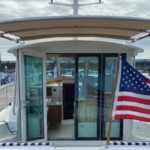Cummins Marine Diesel Repower Specialists › Forums › General Discussion › Wolverines
- This topic has 14 replies, 7 voices, and was last updated 1 year ago by
 William Walter.
William Walter.
-
CreatorTopic
-
June 29, 2022 at 1:31 pm #133685

William WalterParticipantVessel Name: Positive rate
Engines: Cummings 480ce
Location: Long island
Country: Usa
Love my wolverines but after a year and a half it seems one has failed.Doesn’t seem like there is any trouble shooting to do as basically there is just a plug and a pad.Anybody have to take one off and replace. Seems like a pain to remove.I was hoping for more than a year and a half.outlet is fine.Bill
-
CreatorTopic
-
AuthorReplies
-
October 20, 2022 at 3:18 pm #138073

William WalterParticipantVessel Name: Positive rate
Engines: Cummings 480ce
Location: Long island
Country: Usa
Wolverines with thermostat
Tjborro I found those on Amazon. I was considering them also but the reviews weren’t great.About 100 bucks each.One reviewer said he got about a year and a half on his in the marine environment.But if you read all the reviews it’s hard to buy anything.They would seem to be a perfect solution if they last.Let us know.Bill
October 20, 2022 at 7:10 am #138060
tjborroParticipantwolverine with thermostadt
I lost of mine also after about 1.5 years.
looking for the replacement, I found one with a thermostadt.
<ul class=”a-unordered-list a-vertical a-spacing-mini”>
- Thermostatically protected: on at 170°(77°C), off at 200°F (93°C)
Installed it this fall. We will see….
October 17, 2022 at 3:13 pm #137995
Laurence WardenParticipantVessel Name: North Star
Engines: Twin 370 hp Cummins
Location: San Diego
Country: United States
I use the Wolverine pads on both engines and have them connected to a simple controller with a thermocouple attached to the block just above the oil pan. This seems to work well and so far I have a couple years out of them.
The controller is similar to this one:
August 7, 2022 at 1:29 pm #135116
William WalterParticipantVessel Name: Positive rate
Engines: Cummings 480ce
Location: Long island
Country: Usa
Thanks for all the ideas.Some good suggestions. I think a better solution would be a pad that is designed to only come on when below a certain temperature. I know the pads were mostly designed for winter operations on cars and trucks. Perhaps a version for marine use could be designed that has a temperature sensor so they would be more effective for 24/7 operation..I’m sure they would cost more but we have boats so we are used to that.
August 7, 2022 at 1:02 pm #135114
Brad ArringtonParticipantVessel Name: Jennifer B.
Engines: QSC 8.3 600
Location: Long Island, NY
Country: US
I guess I’d consider myself in the “hands-on” category, and proficient with electric. I’m also not afraid to admit I don’t know what I’m doing, and go learn how to do things properly. <br /><br />Sometimes I forget that not everyone is that way. I tend to assume anyone posting here is in the same category.
August 7, 2022 at 10:53 am #135107
Tony AthensModeratorVessel Name: Local Banks
Engines: QSB 6.7 550 HP
Location: Oxnard, CA
Country: USA
Very Good solution but only for those that are totally “hands-on” and got a “A” in ” Basic Electricity 101″
August 7, 2022 at 9:16 am #135099
Brad ArringtonParticipantVessel Name: Jennifer B.
Engines: QSC 8.3 600
Location: Long Island, NY
Country: US
Time delay relay
You could also use something like a Macromatic time delay relay. The delay is settable, from something like .5 seconds to 1000 hours (depends on the model). I’d think one that allows a time delay of a few hours would work. <br /><br />Wire the heater to the load, and the control side to a switch. The switch would need to be powered to keep the coil switch shut, but it could be either DC or AC power – there are both types of relays. Just pick a power source that will be energized when away from the boat. <br /><br />
One of the ones from this page should work. These are a plug-in type; you would need a socket to go with it.
When you leave the boat, flip the switch for the relay and a few hours later the pan heater will come on. I have a friend that uses one of these delay relays to simplify the holding tank macerator operation. Pic attached. <br /><br />
August 6, 2022 at 1:57 pm #135076
Tony AthensModeratorVessel Name: Local Banks
Engines: QSB 6.7 550 HP
Location: Oxnard, CA
Country: USA
Clark,
You are a good thinker! Thanks
August 6, 2022 at 10:50 am #135068
Clark LeighsParticipantTony’s mention of a delay device would be a good idea.
An Airpax switch , NC, chosen to open at something like 120oF could be installed glued to the pan as close to the Pad as possible.
They would open shutting the pad off as the oil temp rises. THey generally have a return closing of about 10F meaning it would not reclose untill about 110 F.
Tony may have some or can be obtained from electronics supplies such as Mouser, Newark and so on.
I can’t remember the current rating so check that out. It may mean you need the Airpax to operate a relay.
THe relay won’t stand the heat but will the current chosen correctly so it would need to be mounted elsewhere and the Airpax will withstand the heat and control the relay. Get a relay with at least 1.5 or 2 times the current expected of the pan heater.
THe pad will still get hot from the oil but won’t overheat the same way. This is just a suggestion as I have never tried it in this application..
August 3, 2022 at 5:52 am #134970
Tony AthensModeratorVessel Name: Local Banks
Engines: QSB 6.7 550 HP
Location: Oxnard, CA
Country: USA
Wolverine OIL PAD Heaters
I am certain that if the units are left on (maybe the gen set feeds them 120vAC) when the engine is running and oil pan temps rise, the life of the pads will be reduced. Oil sump temps can easily reach over 200 F ( usually run 20-40 F over coolant temps)
Plugging them in after a trip and are now back at the dock ( engine hot) will probably also reduce their life too, but you gotta do what you gotta do.. A delay circuit gizmo for them ( maybe a couple of hours) when 1st turning them on would be neat.
August 3, 2022 at 4:52 am #134968
William WalterParticipantVessel Name: Positive rate
Engines: Cummings 480ce
Location: Long island
Country: Usa
Rob when I talked to the rep he told me the life of the pad would be reduced significantly if they were left on 24/7.He gave me a number of hours for the life expectancy of the pads which I’m sure I never approached so I had to wonder why mine failed. I’m pretty sure the installation was good so I started thinking about how I used them.Since I thought they were 24/7 I never hesitated to turn them on when leaving boat and the engines were still hot.I’m guessing that they should never be turned on until the pan has cooled to a certain point.Just a guess at that.
August 2, 2022 at 4:23 pm #134962
Rob SchepisForum ModeratorVessel Name: Tenacious
Engines: 6BTA 5.9 330's - "Seaboard Style"
Location: Long Island, NY
Country: USA
What did the manuf. tech guy say ?
August 2, 2022 at 4:15 pm #134961
William WalterParticipantVessel Name: Positive rate
Engines: Cummings 480ce
Location: Long island
Country: Usa
Clark I agree with all you wrote. I’m sure my install was not the issue .They were prepped properly and are very tight on the pan at this time. From what I read on this site I was led to believe they could be used 24/7.After talking to the manufacturer tech department I was told that was incorrect.They have a finite life which everything has but it’s not as long as we would like. I’m thinking my time was cut down because of overheating. I would sometimes turn them on when I was leaving the boat and the engines were still hot.Not sure if that was my issue but maybe. I wanted them on while I was away and thought nothing more about it till they both quit.
July 22, 2022 at 8:02 am #134553
Clark LeighsParticipantThey should last longer. However like all things electrical/mechanical there can be a failure rate.
A not quite right installation can also affect longevity.
If the pan mounting area was not properly prepared, clean of any/all paint, grease an oil free, proper application of the mounting goo with as thin a layer as possible and exclusion of all air pockets, with adequate support so the pad cannot sag then heat may build in those inadequately prepared areas.
THat can lead to overheating of the heater and failure.
Just some ideas
-
AuthorReplies
You must be logged in to reply to this topic.
